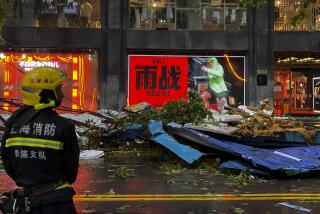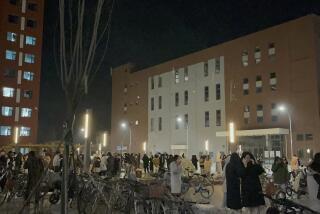China’s cold wave takes hefty toll
- Share via
SHANGHAI — The worst snowstorm in a half-century is wreaking havoc on China’s economy, destroying crops and livestock, paralyzing transportation and disrupting operations at countless factories and companies.
A senior Chinese official said Friday that the brutal weather conditions, which have claimed at least 60 lives, had caused economic losses of about $7.5 billion over the last three weeks. But analysts said the toll would be much higher.
Beijing-based Anbound Consulting Group estimated Friday that damages would exceed $42 billion. China’s economic growth was already expected to slow to about 10% this year from 11.4% in 2007 because of the teetering U.S. economy and reduced demand for Chinese-made goods. The storms could take that to 9%.
Anbound analyst He Jun said he was particularly concerned about China’s chronic power shortages, which have been exacerbated by the freezing weather and shortsighted government policy. Ice and snow in central, eastern and northern China have strained the nation’s rail system, disrupting deliveries of coal, which fuels about 80% of the country’s electricity supply.
Beijing has responded by reopening small mines, halting coal exports and setting up an emergency rail line for coal shipments. But some generating stations had been shut on purpose because the government had restricted utility rate increases even as coal producers sharply raised prices.
“This is another case where energy [shortfalls] are cutting the economy’s throat,” analyst He said. “Because of government interference, the price of energy cannot reflect the demand and supply relation, and if the weather keeps like this, electricity supply as well as the entire economic situation will face more problems.”
Three weeks ago, Beijing froze the price of gasoline and other energy sources, as well as water and electricity rates, seeking to allay public discontent over inflation, which hit an 11-year high late last year. The price controls were intended to give relief to the public ahead of the lunar New Year holiday.
But the cold weather has left tens of millions of workers stranded in rail stations and other places, and many others are facing shortages of heat and even higher prices for vegetables and other food amid shrinking supplies.
The Ministry of Agriculture reported that crops on nearly 1.9 million acres of farmland were destroyed. Wheat, oranges, cabbages and other vegetables were hit particularly hard, the government said.
The cold also dealt a blow to dairy and meat supplies, the prices of which already had been soaring, driving much of the food inflation last year. Some 874,000 pigs (about 2% of the nation’s stock), 85,000 cattle, 459,000 sheep and 14.4 million poultry have died, the official New China News Agency reported, citing an Agriculture Ministry official.
In the central Chinese city of Wuhan, parts of which were covered in ice this week, residents said they were rationing vegetables because prices had shot up in the last month.
The cost of bok choy and peppers has more than tripled, said Li Yan, 49, a college professor in the city of 10 million. Another type of flowering Chinese cabbage, a local specialty, has gone up tenfold in some shops, he said.
“We usually prepare to pay more for meat” before lunar New Year, Li said. “But we didn’t worry about vegetables and bought them freely whenever we wanted. Now we have to cut down on that.”
Some economists predict that the weather crisis will add as much as one-half percentage point to China’s inflation this year. Still, with the U.S. economy sagging and the storm damage, analysts say, Chinese officials may shift their focus from fighting inflation to maintaining growth. This week, China’s central bank ordered banks to ease up on credit to help those hurt by the freeze.
What Zhi Hehong needs isn’t credit but clearer roads. The general manager of Jinjiang Transportation Co. in Wuhan said it had taken five days for his drivers to get from Wuhan to Shanghai, a 750-mile trip that usually takes a day.
“One of my trucks just arrived in Guangzhou” -- also usually a 24-hour haul, Zhi said -- “and it took the driver nine whole days to get there.”
Out of a fleet of 150 trucks, filled with tissue paper, frying pans, computers and other factory goods, he said, “I still have over 10 [vehicles] stuck on the roads.”
Zhi said he hadn’t begun to calculate his losses, but reckoned it would be at least $42,000 for the last month.
“Our monthly profit is only $11,000 to $14,000,” he added. “Of course I’m under big pressure and I’m very anxious.”
Similar concern is palpable in China’s stock trading halls.
In the past, Chinese investors could count on a little bounce before the lunar New Year as people looked hopefully toward the holiday and a fresh start. This time it’s doubtful.
On Friday, Shanghai’s composite stock index fell again, dropping 1.4% and bringing the losses for the week to 9.3%. It is down 18% for the year.
Most other Asian stock markets, though also down for the year, have been clawing back since a global sell-off two weeks ago. There are two trading days before the weeklong holiday, but Hong Ya, for one, doesn’t have high hopes.
“Because of the weather, everything is not going right -- food, transportation, fuel,” said the Shanghai homemaker, whose family’s stock portfolio is down about 28% since its fall peak. Next week “it probably won’t be good,” she said. “A bull market won’t come this year. Let me earn a little more, and I will leave the market.”
Cao Jun in The Times’ Shanghai Bureau contributed to this report.
More to Read
Sign up for Essential California
The most important California stories and recommendations in your inbox every morning.
You may occasionally receive promotional content from the Los Angeles Times.














